Intro
Discover effective coping strategies and techniques to manage stress, anxiety, and emotional overwhelm, learning how to cope with challenges and build resilience through self-care, mindfulness, and mental wellness practices.
Coping with life's challenges is an essential skill that can make a significant difference in our overall well-being and happiness. It's natural to face difficulties and setbacks, but it's how we respond to them that matters. Effective coping mechanisms can help us navigate through tough times, reduce stress and anxiety, and improve our mental and physical health. In this article, we will explore the importance of coping, its benefits, and provide practical tips and strategies to help you develop healthy coping habits.
Dealing with stress, trauma, or significant life changes can be overwhelming, and it's easy to feel lost or stuck. However, by learning how to cope, we can regain control over our lives, build resilience, and develop a more positive outlook. Coping is not about avoiding problems or difficulties but about facing them head-on, learning from them, and growing as individuals. By developing healthy coping mechanisms, we can improve our relationships, work performance, and overall quality of life.
The ability to cope with challenges is closely linked to our mental health and well-being. When we fail to cope, we may experience anxiety, depression, or other mental health issues. On the other hand, effective coping can help us manage stress, regulate our emotions, and maintain a healthy work-life balance. Moreover, coping skills can be learned and developed over time, making it possible for anyone to improve their ability to deal with challenges. Whether you're facing a specific issue or looking to develop general coping skills, this article will provide you with valuable insights, practical advice, and expert tips to help you navigate life's challenges with confidence.
Understanding Coping Mechanisms
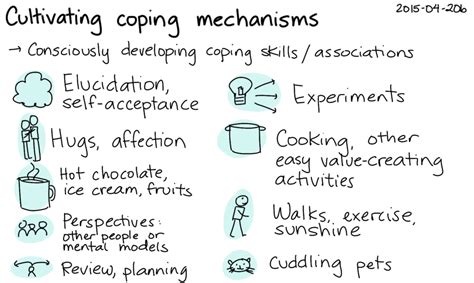
Types of Coping Mechanisms
There are several types of coping mechanisms, including: * Problem-focused coping: This involves directly addressing the problem or challenge, trying to find solutions, and taking action to resolve the issue. * Emotion-focused coping: This involves managing and regulating our emotions, reducing stress and anxiety, and maintaining a positive outlook. * Social support coping: This involves seeking help, support, and guidance from others, such as friends, family, or mental health professionals. * Avoidance coping: This involves avoiding or escaping from the problem or challenge, which can provide temporary relief but often worsens the issue in the long run.Benefits of Healthy Coping
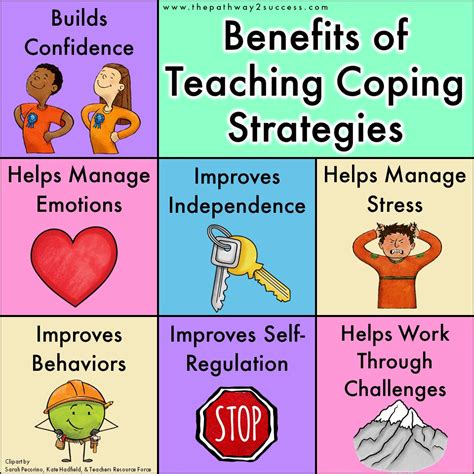
Developing Healthy Coping Habits
Developing healthy coping habits takes time, effort, and practice. Here are some tips to help you get started: * Identify your coping mechanisms: Become aware of your current coping mechanisms, including both healthy and unhealthy ones. * Learn new skills: Try new coping techniques, such as mindfulness, exercise, or creative activities. * Practice self-care: Take care of your physical, emotional, and mental needs, including getting enough sleep, eating a healthy diet, and engaging in relaxation techniques. * Seek social support: Build a strong support network of friends, family, and mental health professionals. * Challenge negative thoughts: Learn to recognize and challenge negative thought patterns, replacing them with more positive and realistic ones.Overcoming Obstacles to Coping
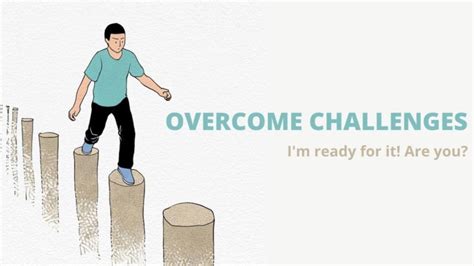
Strategies for Overcoming Obstacles
To overcome obstacles to coping, try the following strategies: * Seek professional help: Consult with a mental health professional or counselor to address underlying issues and develop a personalized coping plan. * Build a support network: Surround yourself with positive, supportive people who can encourage and motivate you. * Practice self-compassion: Treat yourself with kindness, understanding, and patience, just as you would a close friend. * Take small steps: Break down large challenges into smaller, manageable tasks, and take small steps towards developing healthy coping habits. * Celebrate successes: Acknowledge and celebrate your successes, no matter how small they may seem.Coping with Specific Challenges
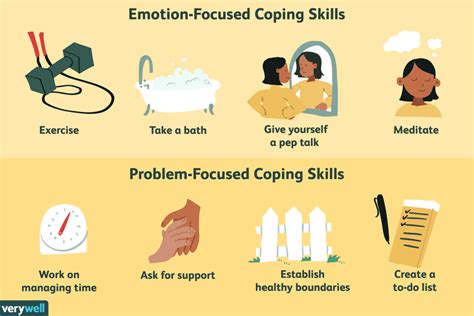
Real-Life Examples of Coping
Here are some real-life examples of coping: * A person who has experienced a traumatic event may practice grounding techniques, such as focusing on their five senses, to manage flashbacks and anxiety. * A person who is experiencing work-related stress may take regular breaks, prioritize tasks, and engage in stress-reducing activities, such as exercise or meditation. * A person who is struggling with a mental health issue may seek professional help, practice self-care, and engage in stress-reducing techniques, such as deep breathing or progressive muscle relaxation.Maintaining Healthy Coping Habits
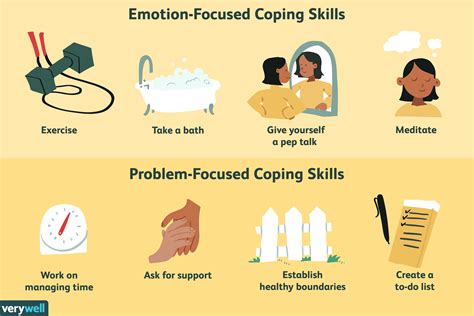
Common Pitfalls to Avoid
Here are some common pitfalls to avoid when maintaining healthy coping habits: * Complacency: Avoid becoming too comfortable or complacent, as this can lead to a decline in healthy coping habits. * Negative self-talk: Avoid negative self-talk or self-criticism, as this can undermine motivation and confidence. * Unrealistic expectations: Avoid setting unrealistic expectations or goals, as this can lead to disappointment and frustration.What are some common coping mechanisms?
+Common coping mechanisms include exercise, mindfulness, social support, and problem-focused coping.
How can I develop healthy coping habits?
+To develop healthy coping habits, identify your current coping mechanisms, learn new skills, practice self-care, seek social support, and challenge negative thoughts.
What are some obstacles to coping, and how can I overcome them?
+Common obstacles to coping include lack of motivation, limited access to resources, negative thought patterns, trauma, and mental or physical health issues. To overcome these obstacles, seek professional help, build a support network, practice self-compassion, take small steps, and celebrate successes.
How can I maintain healthy coping habits over time?
+To maintain healthy coping habits, practice consistently, seek ongoing support, monitor progress, and stay flexible. Avoid common pitfalls such as complacency, negative self-talk, and unrealistic expectations.
What are some real-life examples of coping?
+Real-life examples of coping include practicing grounding techniques to manage flashbacks and anxiety, taking regular breaks to reduce work-related stress, and seeking professional help to address mental health issues.
In conclusion, coping is an essential skill that can make a significant difference in our overall well-being and happiness. By understanding coping mechanisms, developing healthy coping habits, and maintaining them over time, we can improve our mental and physical health, build resilience, and enhance our overall quality of life. We hope this article has provided you with valuable insights, practical advice, and expert tips to help you navigate life's challenges with confidence. If you have any questions or comments, please don't hesitate to share them below. Let's work together to build a community that supports and encourages healthy coping habits.
